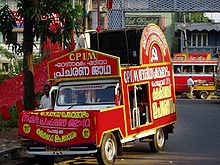Communist Party of India (Marxist)
| भारतीय कम्युनिस्ट पार्टी (मार्क्सवादी) Communist Party of India (Marxist) |
|
|---|---|

|
|

|
|
| Party leader | Sitaram Yechury |
| founding | November 7, 1964 |
| Place of foundation | Delhi , India |
| Youth organization | Democratic Youth Federation of India |
| newspaper |
People's Democracy Ganashakti Deshabhimani |
| Alignment | communism |
| Colours) | red |
| Parliament seats |
Lok Sabha : 9/545 Rajya Sabha : 8/245 |
| International connections | International meeting of communist and workers' parties |
| Website | www.cpim.org |

The Communist Party of India (Marxist) - abbreviated CPI (M) or often also CPM - is the largest left party in India . It was created in 1964 when the Communist Party of India (CPI) split .
In the parliamentary elections in 2014, she got 9 seats in the Lok Sabha , the lower house, and lost seven seats compared to the 2009 elections (16 seats).
Party history
When the Indian communists split into two factions at a party congress in 1964, mainly due to internal party disputes about the position on the Indo-Chinese border war in 1962, the later CPI (M) made the wing that was more based on the Chinese model, while the CPI followed Moscow's guidelines - the explicitly Maoist forces split off from the CPI (M) in 1967-69 and founded various organizations known under the collective term Naxalites . At least since the end of the Cold War , the collapse of the Soviet Union and the market economy reforms in the People's Republic of China , the ideological differences have lost their significance. Since the late 1990s there has been repeated talk of a possible overcoming of the communist split in the near future.
By far the most prominent representative of the party was Jyoti Basu , who was Chief Minister of West Bengal for more than 23 years and was unsuccessfully proposed for the office of Indian Prime Minister by the parties of the victorious United Front coalition after the parliamentary elections in India in 1996 . From 1977 to 2011, the Left Front ruled in West Bengal without interruption under the leadership of the Marxists - a rare phenomenon given the short-lived nature of many state governments in India. The CPI (M) and its partners succeeded in significantly advancing the agricultural reform in West Bengal and in installing social security systems. The policy under Basu and his successor in the office of West Bengal Prime Minister Buddhadeb Bhattacharya , which was oriented towards the needs of the broad masses of the people, had given the party a permanently high potential for support. In the small state of Tripura, the alliance led by the Marxists also ruled for several legislative periods until it came to an end in 2018, and in Kerala the left-wing front has effectively alternated with the Congress party as the winner in elections since the 1970s .
In spring 2005 there was a generation change in leadership at the party congress . After Harkishan Singh Surjeet's resignation from the office of General Secretary due to health problems , the delegates elected Prakash Karat as his successor. In previous years, he had already appeared as an important member of the management team.
Since around 2009 and the parliamentary elections at the time , the vote share of the left-wing parties in India has fallen sharply. The CPM experienced particularly drastic losses in its stronghold of West Bengal, where the 2011 parliamentary election against the Trinamool Congress was lost. This marked the end of the CPM's 34-year uninterrupted term in West Bengal, which had existed since 1977. In the all-India parliamentary elections in 2014 and the parliamentary elections in West Bengal in 2016, the Trinamool Congress was able to further expand its leadership over the CPM. In 2018, the CPI (M) also lost the small state of Tripura , which it had ruled uninterruptedly for 25 years before. However, the CPI (M) won the 2016 parliamentary elections in Kerala, South India, and then formed the government.
List of previous General Secretaries
Since April 19, Sitaram Yechury has been the party's general secretary.
- Puchalapalli Sundarayya (1964–1978)
- EMS Namboodiripad (1978–1992)
- Harkishan Singh Surjeet (1992-2005)
- Prakash carat (2005-2015)
- Sitaram Yechury (2015, currently in office)
Election results
The following table shows the election results (seats won and share of votes) in the all-India parliamentary elections.
| year | choice | voting share |
Seats in parliament |
|---|---|---|---|
| 1967 |
|
4.28% |
19/520 |
| 1971 |
|
5.12% |
25/518 |
| 1977 |
|
4.29% |
22/542 |
| 1980 |
|
6.24% |
37/514 |
| 1984 |
|
5.87% |
22/514 |
| 1989 |
|
6.55% |
33/529 |
| 1991 |
|
6.16% |
35/521 |
| 1996 |
|
6.12% |
32/543 |
| 1998 |
|
5.16% |
32/543 |
| 1999 |
|
5.40% |
33/543 |
| 2004 |
|
5.66% |
43/543 |
| 2009 |
|
5.33% |
16/543 |
| 2014 |
|
3.25% |
9/543 |
| 2019 |
|
1.75% |
3/542 |
Web links
- CPI (M) website
- Ganashakti - English language news portal of the Bengali-language daily newspaper of the CPI (M)
- The Indian Communists by Eric Töpfer on suedasien.info
Individual evidence
- ↑ http://economictimes.indiatimes.com/news/politics/nation/Basus-historic-blunder-is-Mulayams-biggest-regret/articleshow/5431876.cms
- ^ Election Results - Full Statistical Reports. Indian Election Commission, accessed on April 22, 2017 (English, election results of all Indian elections to the Lok Sabha and the parliaments of the states since independence).
